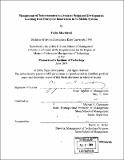Management of telecommunication systems design and development : learning from disruptive innovations in 3G mobile systems
Author(s)
Mochizuki, Yujiro, 1973-
DownloadFull printable version (4.159Mb)
Other Contributors
Massachusetts Institute of Technology. Management of Technology Program.
Advisor
Michael A. Cusumano.
Terms of use
Metadata
Show full item recordAbstract
Disruptive innovations in network systems are forcing mobile carriers to manage difficult network software development. Within the limited development time, mobile carriers are required to develop large scale, high quality and robust network software, and accomplish smooth transition/upgrading. In the drastic transition of the network architecture, network carriers often fail to develop platform network software. Compared with KDDI, NTT DoCoMo (DoCoMo) has been coping with network migration problems. The critical difference in both mobile carriers is whether the platform-based approach was applied sufficiently in the network software development. DoCoMo's insufficient platform-based approach led to migration difficulties. On the other hand, the consistent platform-based approach allowed KDDI to enjoy successful migration. In order to identify the critical factors in network software development related to this problem, this thesis (1) explores the characteristics of network innovations and (2) analyzes the platform innovations in mobile network software. The ultimate goal of this thesis is to (3) suggest how incumbent mobile carriers can avoid the potential threats and develop the platform network software in future disruptive network innovations. In the future, management of telecommunication systems design and development will face more challenging and more complicated migration because the network concepts and architecture will be completely different from those in the existing 3G networks. The lessons learned from the case studies DoCoMo and KDDI suggest ideas that mobile carriers can utilize to address tough situations. (cont.) The platform-based approach definitely will help the migration strategies of mobile carriers and reduce the potential threats in current and future network systems.
Description
Thesis (S.M.M.O.T.)--Massachusetts Institute of Technology, Sloan School of Management, Management of Technology Program, 2004. Includes bibliographical references (leaves 109-112).
Date issued
2004Department
Management of Technology Program.; Sloan School of ManagementPublisher
Massachusetts Institute of Technology
Keywords
Management of Technology Program.